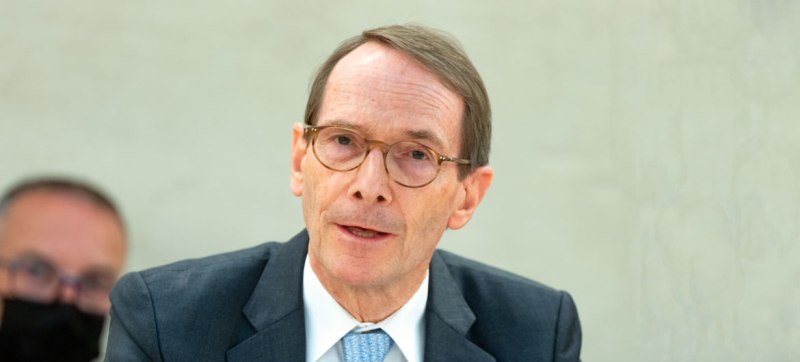 Ukraine
Ukraine
UN investigators say Russian authorities are using torture “with a sense of impunity” in Ukraine war
Russian authorities are using torture “with a sense of impunity” in the ongoing war in Ukraine, the UN Human Rights Council in Geneva heard on Monday.
In an oral update to members, Erik Møse, chair of the Commission of Inquiry on Ukraine, said it has documented new cases of torture committed by Russian authorities against civilians and prisoners of war in occupied areas of Ukraine and in the Russian Federation.
“We gathered evidence of sexual violence used as torture, mainly against male victims in detention, and of rapes targeting women in villages under Russian control,” he said.
“The wide geographic spread of locations where torture was committed and the prevalence of shared patterns demonstrate that torture has been used as a common and acceptable practice by Russian authorities, with a sense of impunity,” he added.
Consistency and coordination
The three-member Commission was established roughly a week after the start of the full-scale Russian invasion of Ukraine on 24 February 2022. It has previously highlighted how torture committed by Russian authorities has been both widespread and systematic.
Møse said recent investigations show that Russian authorities have committed torture in Ukrainian regions under Russian control, thus reinforcing the finding that torture has been widespread, while additional common elements uphold that it has been systematic.
“One element is the consistency of practices in detention centres where detainees from Ukraine have been held in the Russian Federation, and the replication of these practices in several large penitentiary centres in occupied areas of Ukraine,” he said.
“Another common element emerging from the evidence points towards a coordinated use of personnel from specific services of the Russian Federation who are involved in torture in all the detention facilities investigated by the Commission. A further common feature is the recurrent use of sexual violence as a form of torture in almost all these detention centres.”
Brutal treatment tolerated
The Commission also cited the testimonies of former detainees who said prison staff in the Russian Federation referred to orders to inflict brutal treatment. Furthermore, in some facilities higher ranking authorities ordered, tolerated or took no action towards stopping it.
“For instance, in a detention centre in occupied territories of Ukraine, a witness described the arrival of a penitentiary official from the Russian Federation who introduced himself to the detainees, stating, ‘I broke everyone and will do the same to you’”, said Møse.
He noted that “a disturbing factor” reported in many detention facilities was the lack of adequate medical assistance. “In one facility, even penitentiary doctors participated in the torture,” he added.
Olenivka prison blast
Mr. Møse said one egregious illustration was provided through compelling testimonies of former detainees at the Volnovakha Correctional Colony in Ukraine, known as Olenivka, where a blast on 29 July 2022 led to the death of many Ukrainian prisoners of war.
“According to them, no immediate medical support was provided to dozens of others who suffered life-threatening injuries. Ukrainian military doctors, detained in the colony, were the only ones attempting to deliver first aid during that night,” he said.
“They recounted assisting fellow soldiers, in the dark and without vital medical equipment, using the small amount of supplies remaining in their own first-aid kits and bed sheets for bandages. They saw many die that night, while the leadership of the Olenivka colony stood by and watched.”
Victims call for justice
Møse said these violations have left many victims with grave or irreparable physical harm and trauma, with deep psychological impacts for both them and their families.
“Many victims expressed a vital need for justice to be done,” he said. “The Commission reiterates the importance of continuing investigations, identification of perpetrators, and accountability, as well as comprehensive support for victims.”
Attacks on hospitals, supermarkets
The Commission also continued documenting attacks with explosive weapons affecting civilian objects in populated areas, with devastating consequences.
It investigated attacks that struck medical institutions, cultural objects, residential buildings, and supermarkets in territories under Ukrainian Government control.
He said Russia’s repeated waves of large-scale attacks on Ukraine’s energy infrastructure have resulted in power outages sometimes affecting millions, with older people and persons with difficulties particularly affected.
The power outages have also led to disruptions of online education, resulting in greater losses for displaced children and children with disabilities, who are more likely to enroll in remote education.
Commission of Inquiry
The UN Independent International Commission of Inquiry on Ukraine was established on 4 March 2022 to investigate all alleged violations and abuses of human rights, violations of international humanitarian law and related crimes in the context of Russia’s aggression against Ukraine.
The Commission receives its mandate from the Human Rights Council and its members are not UN staff and do not receive payment for their work.
Photo Caption: Erik Møse, Chairperson of the Independent International Commission of Inquiry on Ukraine (file). Photo Courtesy: UN Photo/Jean Marc Ferré
Support Our Journalism
We cannot do without you.. your contribution supports unbiased journalism
IBNS is not driven by any ism- not wokeism, not racism, not skewed secularism, not hyper right-wing or left liberal ideals, nor by any hardline religious beliefs or hyper nationalism. We want to serve you good old objective news, as they are. We do not judge or preach. We let people decide for themselves. We only try to present factual and well-sourced news.







